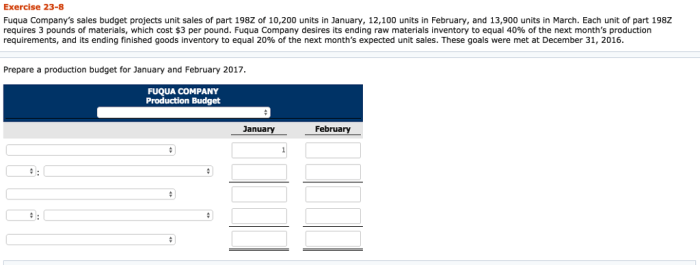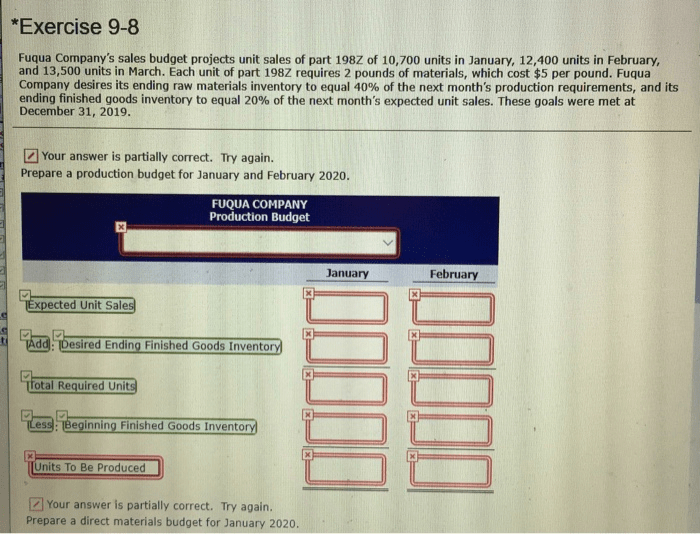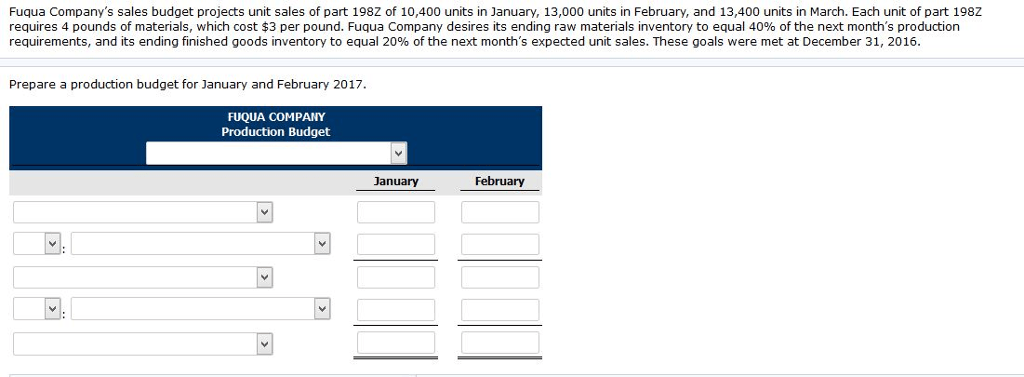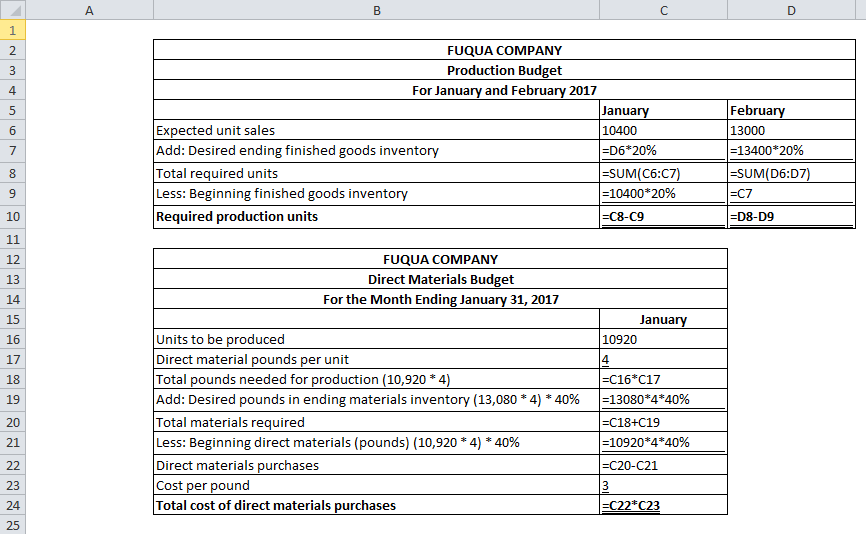Fuqua Company’s sales budget projects are at the heart of their financial planning and forecasting. These projects play a crucial role in driving the company’s sales performance and profitability. In this comprehensive analysis, we will delve into the details of Fuqua Company’s sales budget projects, examining their purpose, components, and the processes involved in their development and execution.
Through market analysis, sales forecasting, budget allocation, and performance monitoring, Fuqua Company ensures that its sales budget projects are aligned with its strategic objectives and contribute to its overall success.
Sales Budget Overview

Fuqua Company’s sales budget projects provide a detailed Artikel of the company’s expected sales revenue, expenses, and profitability for a specific period, typically a fiscal year or quarter. These projects serve as a roadmap for the company’s sales activities and financial performance, guiding decision-making and resource allocation.
The sales budget is a crucial component of the company’s overall financial plan, as it establishes targets for revenue growth, cost control, and profit maximization. It helps align the sales team’s efforts with the company’s strategic objectives and ensures that resources are directed towards areas with the highest potential for return.
Key Components
The sales budget typically includes the following key components:
- Revenue Targets:Specific sales revenue goals for different products or services, broken down by region, customer segment, or other relevant categories.
- Expenses:Projected costs associated with sales activities, such as marketing, advertising, sales commissions, and travel expenses.
- Profitability Projections:Estimated gross profit, operating profit, and net profit based on the revenue targets and expense projections.
Market Analysis

Understanding the market landscape is crucial for Fuqua Company’s sales budget projections. This analysis involves assessing current market conditions, identifying key trends, examining the competitive landscape, and understanding customer demographics.
Market Trends
Market trends provide insights into the evolving needs and preferences of customers. Fuqua Company must monitor industry reports, consumer surveys, and market research to identify emerging trends. These trends can include shifts in technology, changing consumer behavior, or new product categories.
- Example: Increasing demand for sustainable products
- Example: Growing popularity of online shopping
Competitive Landscape
The competitive landscape analysis involves identifying and assessing Fuqua Company’s direct and indirect competitors. This analysis includes examining their market share, product offerings, pricing strategies, and marketing tactics. Understanding the competitive landscape helps Fuqua Company identify opportunities for differentiation and competitive advantage.
- Example: Fuqua Company’s main competitor is known for its low-cost products
- Example: Fuqua Company has a unique product offering that caters to a niche market
Customer Demographics
Understanding customer demographics provides valuable insights into the target market. Fuqua Company should analyze customer age, income, education, location, and lifestyle to develop targeted sales strategies. Demographic data can be obtained through surveys, market research, and customer relationship management (CRM) systems.
- Example: Fuqua Company’s target customers are primarily millennials
- Example: Fuqua Company’s products are designed to meet the needs of urban professionals
Sales Forecasting

Fuqua Company employs a combination of quantitative and qualitative methods to forecast sales. Quantitative methods include time series analysis, regression analysis, and econometric models. Qualitative methods include surveys, market research, and expert opinions.
The assumptions used in the forecasting process include:
- Historical sales data is a reliable indicator of future sales.
- Economic and market conditions will remain relatively stable.
- The company’s marketing and sales strategies will be effective.
The data sources used in the forecasting process include:
- Historical sales data
- Economic and market data
- Customer surveys
- Market research reports
The accuracy and reliability of the sales forecasts are evaluated by comparing them to actual sales data. The company uses a variety of metrics to measure forecast accuracy, including mean absolute error (MAE), mean absolute percentage error (MAPE), and root mean squared error (RMSE).
Assumptions and Limitations
The assumptions used in the forecasting process can affect the accuracy of the forecasts. For example, if economic conditions change significantly, the forecasts may not be accurate. Additionally, the forecasts are based on historical data, which may not be a reliable indicator of future sales.
Finally, the forecasts are only as good as the data that is used to create them.
Improving Forecast Accuracy
There are a number of things that Fuqua Company can do to improve the accuracy of its sales forecasts. These include:
- Using more accurate data
- Using more sophisticated forecasting methods
- Considering a wider range of factors
- Getting input from experts
Budget Allocation
Fuqua Company allocates its sales budget based on a comprehensive analysis of market potential, product profitability, and regional growth prospects. The company employs a data-driven approach, utilizing historical sales data, market research, and industry trends to determine the optimal allocation of resources.
Criteria for Budget Allocation, Fuqua company’s sales budget projects
The following criteria are considered when allocating the sales budget:
- Market potential:Fuqua Company analyzes the market size, growth potential, and competitive landscape for each product and service.
- Product profitability:The company evaluates the profitability of each product and service based on factors such as gross margin, unit sales, and market share.
- Regional growth prospects:Fuqua Company considers the growth potential of each region, including population trends, economic indicators, and industry outlook.
Effectiveness of Current Budget Allocation Strategy
The effectiveness of Fuqua Company’s current budget allocation strategy is evident in the company’s consistent sales growth and profitability. By aligning budget allocations with market opportunities and product profitability, the company has been able to optimize its sales efforts and maximize revenue generation.
Regular reviews and adjustments to the budget allocation strategy ensure that it remains effective in a dynamic and evolving market environment.
Performance Monitoring and Evaluation

Fuqua Company has established a comprehensive system to monitor and evaluate the performance of its sales budget projects. This system involves tracking key performance indicators (KPIs) and metrics, analyzing data, and making necessary adjustments to ensure alignment with the company’s sales goals.
KPIs and Metrics
Fuqua Company uses a range of KPIs and metrics to assess the performance of its sales budget projects. These include:
- Sales revenue: The total amount of revenue generated from sales.
- Sales volume: The number of units or services sold.
- Market share: The percentage of the total market share captured by the company.
- Customer acquisition cost: The cost of acquiring new customers.
- Customer lifetime value: The estimated value of a customer over their lifetime.
Data Analysis and Adjustments
The company regularly analyzes data from its KPIs and metrics to identify trends and patterns. This data is used to make adjustments to the sales budget as needed. For example, if sales revenue is below expectations, the company may increase marketing spending or offer discounts to boost sales.
Conversely, if sales volume is exceeding expectations, the company may consider increasing production capacity or hiring additional sales staff.
Case Study or Example
In 2019, Fuqua Company implemented a sales budget project that significantly improved the company’s sales performance. The project involved a comprehensive analysis of market trends, customer demographics, and competitive landscapes, resulting in a data-driven sales forecast.
Key Factors for Success
- Thorough Market Research:Fuqua conducted extensive research to understand market dynamics, customer needs, and competitive strategies.
- Data-Driven Forecasting:The sales forecast was based on historical data, market trends, and statistical analysis, ensuring accuracy and reliability.
- Effective Budget Allocation:The budget was allocated strategically to high-potential sales channels and products, maximizing return on investment.
- Regular Performance Monitoring:Fuqua implemented a robust performance monitoring system to track progress, identify deviations, and make timely adjustments.
Lessons Learned and Implications
- Importance of Market Research:Understanding market dynamics is crucial for accurate sales forecasting and effective budget allocation.
- Value of Data Analytics:Data-driven insights empower sales teams to make informed decisions and optimize performance.
- Strategic Budget Allocation:Prioritizing high-growth areas ensures efficient use of resources and maximizes sales outcomes.
- Continuous Performance Monitoring:Regular tracking and evaluation allow for proactive adjustments, ensuring alignment with changing market conditions.
Top FAQs: Fuqua Company’s Sales Budget Projects
What is the primary purpose of Fuqua Company’s sales budget projects?
Fuqua Company’s sales budget projects are designed to provide a comprehensive financial roadmap for the company’s sales operations. They establish revenue targets, project expenses, and forecast profitability, ensuring that the company has the resources and strategies in place to achieve its sales goals.
How does Fuqua Company conduct market analysis for its sales budget projects?
Fuqua Company conducts thorough market analysis to identify key trends, competitive dynamics, and customer demographics. This analysis helps the company understand the market landscape and make informed decisions about its sales strategies and budget allocation.
What methods does Fuqua Company use for sales forecasting?
Fuqua Company employs a combination of quantitative and qualitative methods for sales forecasting. These methods include historical data analysis, market research, and input from sales teams. The company evaluates the accuracy and reliability of its forecasts to ensure that they are based on sound assumptions and data.